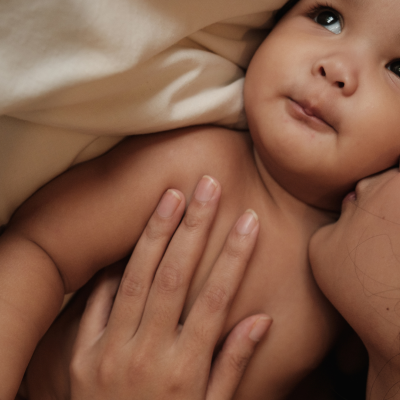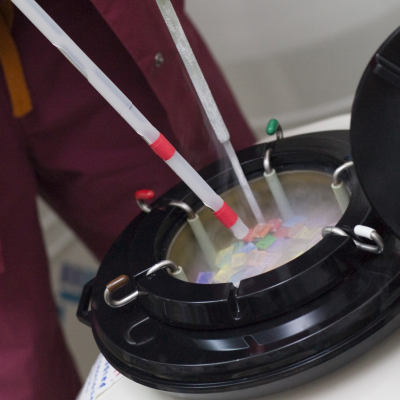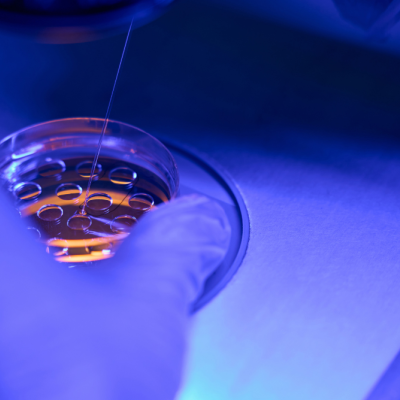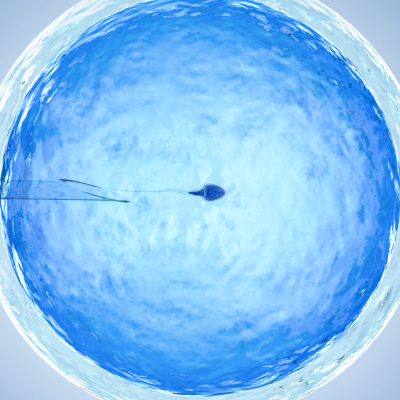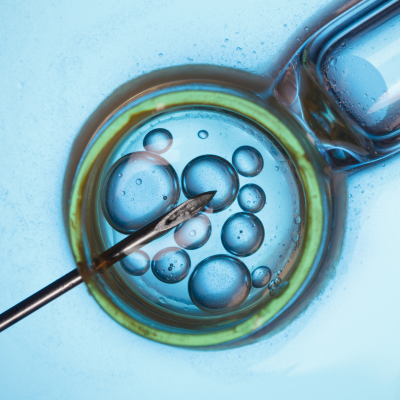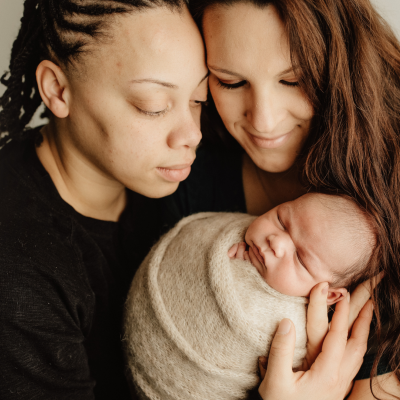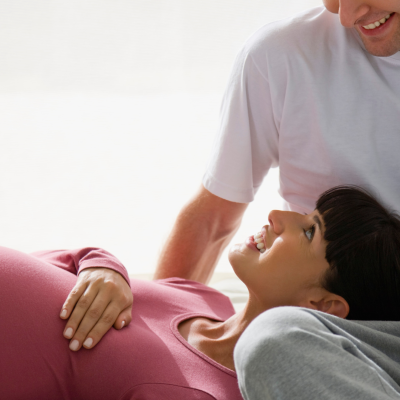Oncofertility in Los Angeles
California Center for Reproductive Health is committed to increasing awareness and optimizing accessibility to fertility preservation options for female patients diagnosed with cancer. Over 100,000 individuals less than 45 years of age are diagnosed with cancer annually in the United States. Cancer diagnosis is terrifying, but thankfully advancements in cancer therapies, particular chemotherapeutics, have led to dramatic improvements in survival. With this increasing improvement in long term survival the medical community has acknowledged the importance of patient counseling and pursuit of options for fertility preservation. The opportunity to have a genetic child in the future is an extremely important quality of life issue for many women.
Oncofertility Q & A
What are the potential impacts of cancer treatment on my future fertility?
The potential impact of cancer treatment on fertility cannot be emphasized enough. Treatment including chemotherapy, radiation, and surgery may result in:
- Depleting the number of eggs stored in the ovaries resulting in early menopause
- Germ cell failure can result in premature ovarian failure
- Reduced production of ovarian hormones can result in early menopausal symptoms
- Uterine or tubal scarring can interfere with fertilization and implantation
- Uterine vascular insufficiency can result in an inability to maintain pregnancy
How much time does it take for a fertility preservation cycle?
Dr. Woo and Dr. Mor work in close coordination with your oncologist to plan for the safest and quickest route of treatment. Expedited treatment options can be started immediately (regardless of where you are in your menstrual cycle) and be finished prior to your planned cancer therapy. The total time from start to finish is approximately 2 weeks.
Is it safe to have ovarian stimulation if I have a hormonally sensitive cancer?
Yes, at CCRH, we only use proven safe protocols designed specifically for hormone sensitive cancer patients. In large studies addition of aromatase modulators such as letrozole, to women with breast cancer undergoing fertility preservation, survival and breast cancer recurrence rates were no different between women who chose to proceed with fertility preservation vs those who did not.
Do I need to have a partner for fertility preservation?
No, you do not need a partner for fertility preservation. With advancement in technology we now perform vitrification, eggs are frozen in a glass like state without damage of water crystal formation. Frozen eggs can be saved indefinitely and thawed to use in the future with equal efficacy as frozen embryos.
Is it safe to carry a pregnancy after I am in remission?
It depends on the particular type of cancer, and treatment you received. In addition, the timing of when to conceive will need to be closely coordinated between your reproductive endocrinologist and your oncologist.
For most breast cancer survivors, current studies do not indicate increased risk of recurrence or decreased risk of survival when a woman chooses to become pregnant while in remission.
How much does it cost for fertility preservation?
Last year, Governor Newsom and the California State Senate passed a Senate Bill No. 600 that states fertility preservation services are a basic health care service that MUST be covered by health care insurers. There are additional resources in the links below including services for other financial assistance for fertility preservation and post treatment family building grants.
Improvements in cancer therapy have led to improved overall survival. Future family building is a significant quality of life issue after cancer. CCRH is a proud partner with LIVESTRONG Foundation and active members of the national Oncofertility Consortium. SAFE AND EFFECTIVE METHODS FOR FERTILITY PRESERVATION EXISTS!
Please do not hesitate to set up an expedited consultation.
Please see our blog for additional questions: https://www.center4reproduction.com/blog/oncofertility
Additional resources for resources:
https://www.livestrong.org/we-can-help/livestrong-fertility
https://www.walgreens.com/topic/pharmacy/specialty-pharmacy/fertility-preservation.jsp
https://www.allianceforfertilitypreservation.org/costs/financial-assistance
Don’t just take our word for it!
Listen to what our patients have to say.
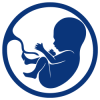
3,000+

20+

2X
FAQ
Reproductive endocrinology and Infertility is a sub-specialty of Obstetrics and Gynecology. In addition to managing medical and surgical treatment of disorders of the female reproductive tract, reproductive endocrinologist and infertility (REI) specialists undergo additional years of training to provide fertility treatments using assisted reproductive technology (ART) such as in vitro fertilization.
Reproductive endocrinologists receive board certification by the American Board of Obstetrics and Gynecology in both Obstetrics and Gynecology and Reproductive Endocrinology and Infertility.
In general, patients should consider consulting with an REI specialist after one year of trying unsuccessfully to achieve pregnancy. The chance of conceiving every month is around 20%, therefore after a full year of trying approximately 15% of couples will still not have achieved a pregnancy.
However, if a woman is over the age of 35 it would be reasonable to see a fertility specialist earlier, typically after 6 months of trying.
Other candidates to seek earlier treatment are women who have irregular menses, endometriosis, fibroids, polycystic ovary syndrome (PCOS), women who have had 2 or more miscarriages, or problems with the fallopian tubes (prior ectopic pregnancy).
Approximately 1/3 of the time cause for infertility is a female factor, 1/3 of the time a male factor, and the remaining 1/3 a couples’ factor.
At CCRH, we emphasize the importance of establishing a correct diagnosis. Both partners undergo a comprehensive evaluation including a medical history and physical exam.
Furthremore, the woman’s ovarian reserve is assessed with a pelvic ultrasound and a hormonal profile. A hysterosalpingogram (HSG) will confirm fallopian tube patency and the uterine cavity is free of intracavitary lesions. A semen analysis is also obtained to evaluate for concentration, motility, and morphology of the sperm.
Additional work up is then individualized to direct the best possible treatment option for each couple.
In vitro fertilization (IVF) is the process that involves fertilization of an egg outside of a woman’s body.
The process starts with fertility drugs prescribed to help stimulate egg development. In your natural cycle, your body is only able to grow one dominant egg, but with stimulation medication we can recruit multiple eggs to continue to grow. After about 8-10 days of stimulation, the eggs are surgically retrieved and then fertilized with sperm in a specialized laboratory. Fertilized eggs are then cultured under a strictly controlled environment within specialized incubators in the IVF laboratory for 3-5 days while they develop as embryos. Finally, embryos (or an embryo) are transferred into the uterine cavity for implantation.
Before deciding if IVF is the right choice, it’s important to sit down with an REI specialist to discuss available treatment options. For some people, other methods such as fertility drugs, intrauterine insemination (IUI) may be the best first choice treatment. At CCRH, we believe each individual couple is unique and not everyone needs IVF.
While not painful, the fertility medications may some side effects including headaches, hot flashes, mood swings, and bloating. The injection sites may also bruise.
Unfortunately, no. Many people think once they start IVF it’s a matter of time that they will be pregnant and have a baby. But according to national statistics per the Society of Assisted Reproduction (SART), on average 40% of assisted reproduction cycles achieve live births in women under age 35. The chances of success then continue to decrease with advancing age.
At CCRH, we employ only evidence-based interventions to ensure patient safety and optimal outcome. While we cannot guarantee a baby, we guarantee that you will receive the best, most advanced, personalized care to help you maximize your chance of a baby.
The average IVF success rate (success measured in live birth rate) using one’s own eggs begins to drop around age 35 and then rapidly after age 40. This is due to the decline in egg quantity and egg quality as a woman ages.
Our clinic’s success rate consistently beats the national average year after year.
Individual insurance plans often do not have any coverage for infertility treatments. If you have a group plan, you can call members services to see if they have coverage for infertility (including consultation/workup and IVF).
After your consultation with our REI specialist, one of our dedicated account managers with sit with you to go over the cost of treatment.

